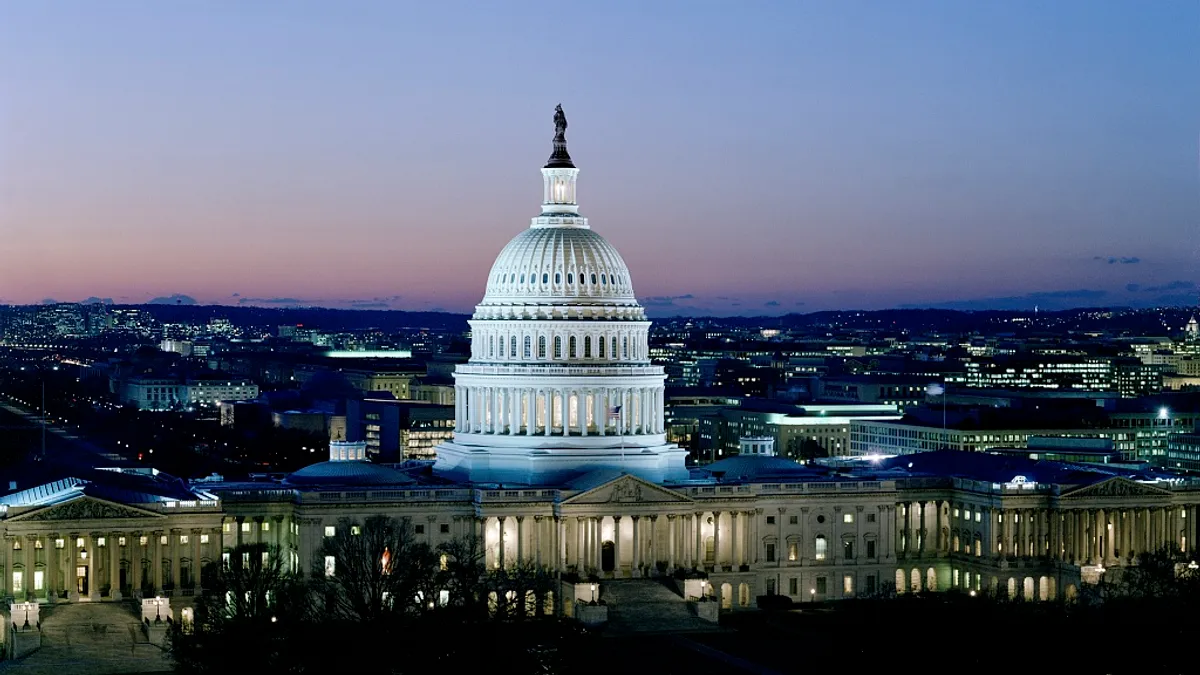Dive Brief:
-
Republican leaders in the House of Representatives on Thursday unveiled a bill that would overhaul U.S. tax policy, including cuts into several existing energy tax incentives, particularly for renewable energy.
-
The tax reform proposal would reduce the wind energy production tax credit to 1.5¢/kWh from 2.3¢/kWh and firm up the expiration date for the incentive. The bill would also end federal tax credits for electric vehicles, but would extend credits for a variety of residential and commercial energy technologies to 2022.
- The bill would also extend an estimated $6 billion tax credit for nuclear power that otherwise would likely expire before the only under-construction nuclear power project would be able to claim it.
Dive Insight:
The long awaited GOP tax reform bill is sure to inspire battles on several fronts. Already, its release prompted quick responses from the renewable energy community, among others.
The American Wind Energy Association claimed the bill would strip away “the investment certainty Congress promised wind developers just two years ago.”
While the production tax credit (PTC) for wind power would remain in place, it would be cut to 1.5¢/kWh from 2.3¢/kWh, a change AWEA says congressional analysts estimate would cut $11 billion in benefits over the next 10 years.
“The proposal could represent a significant hit to the wind energy sector,” Kevin Book, managing director of ClearView Energy Partners, told Bloomberg.
The bill would also hit the electric vehicle industry, with a proposal to end the $7,500 federal credit for EV purchases. When Georgia ended its $5,000 state tax credit for EVs and replaced it with a $200 registration fee in 2015, sales fell 80%.
The bill also would align the expiration dates for tax credits for resources such as solar and wind facilities, fuel cells, and combined heat and power plants, by moving the construction start deadline to Jan. 1, 2022. It would also extend tax credits for residential energy efficiency programs to Dec. 31, 2021.
The bill also would extend a nuclear power production tax credit to new power plants that enter service by 2021. That could benefit the long delayed Vogtle nuclear project being developed by Southern Co. and its partners in Georgia. The project is facing even more delays in the wake of the bankruptcy of the project’s main contractor, Westinghouse Electric, in the spring.
The tax bill would also add tax credits for energy sources such as geothermal, small-scale wind and fuel cells, that were left out of a 2015 budget and spending deal that re-instated the PTC for wind power.
Under current law the tax credit for solar power is set to step down to 10% and then stay there, but under the proposed bill it would end after 2027.
For the oil and gas industries, the tax bill calls for the end of some small tax breaks, including a tax credit for marginal wells. The bill would also eliminate a tax credit for enhanced oil recovery (EOR), which pumps water or carbon dioxide into aging wells to extend their productive life.
In a Nov. 2 letter, a wide ranging group of industry and labor leaders called on the Senate Finance Committee to include an extension of the tax credit for carbon dioxide sequestration in the tax reform bill.
The proponents say the sequestration tax credits would “create opportunities to innovate and improve efficiencies, reducing the costs of capture technologies.” They say the credits are needed to bring down the cost of CO2 captured from power plants and other industrial sources “in order to be economic in [enhanced oil recovery] operations” and to scale up geologic storage of CO2.
The tax bill, Congressional leaders cautioned, is likely to change. Already Sen. Chuck Grassley (R-IA), a powerful ally of the wind industry, has called for amendments to reverse cuts to the PTC, and Sen. Gary Peters (D-MI) is campaigning to save the EV tax credit.
“The wind energy production tax credit is already being phased out under a compromise brokered in 2015," Grasskey said said in a statement. "It shouldn’t be re-opened. I’m working within the Senate Finance Committee to see that the commitment made to a multi-year phase-out remains intact.”














